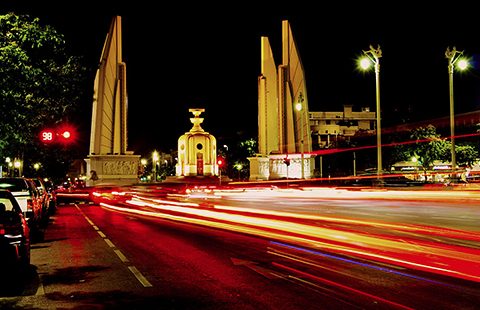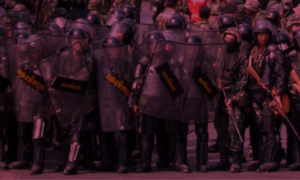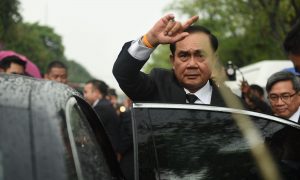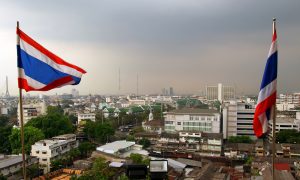This is an unedited transcript of a talk given by Prof. Craig J. Reynolds at an academic forum held at the ANU on 23 Aug 2018, “Whither academic freedom in Thailand? The criminal case against Dr Chayan and four others.” An audio recording of the forum is available below.
Introduction
I’m going to give a brief account of the protest that took place in Chiang Mai Thailand at an international conference last July and then provide some context and background: Why then? Why there? Is there anything new about what happened? What’s the big deal?
First I want to make a couple of general comments, maybe relevant to the general discussion we might have at the end. The first thing to say is that in my judgment this thing called academic freedom is not an absolute. It is contingent, it is a different space in different contexts depending on constraints that are political, legal, religious, cultural. You really can’t say we have it here, they don’t have it there. Was there academic freedom at this international conference in Chiang Mai Thailand last July in a country ruled by a military junta, calling itself the National Council for Peace and Order (NCPO), playing a tricky game with a quixotic king who had been waiting for the throne most of his adult life? The answer is both yes and no: yes, there was quite a lot of academic freedom, for reasons I’ll explain shortly; and no, there were certain things you couldn’t talk about, and conference delegates refrained from talking about those things. But that’s not to say that those things weren’t talked about at previous international conferences in Thailand, because conditions were different on those other occasions. I’ll give some examples in a minute.
The second general comment I have is that academic freedom is vulnerable, it is fragile, everywhere. It is fragile because it is so vulnerable. A case in point is the ANU statement on academic freedom that was issued, if I’m not mistaken, after the negotiations over the Ramsay grant were discontinued earlier this year. It did seem more than coincidence that the university suddenly saw fit to shore up the vulnerable thing called academic freedom, given that Ramsay academics might be present in classrooms monitoring what was being taught, according to the news reports I read.
The incident
What happened last July? At the 13th International Conference on Thai Studies three people held up a sign in Thai writing that said, “an academic forum is not a military camp.” An alternative translation would be “an academic venue is not a military camp.” The conference wasn’t being held at a university campus but at a huge convention centre. So the venue was outside a university; the convention centre had become an academic space.
The three people holding up the sign on 18 Jul 2017 were protesting what happened the previous day when a group of Thai and foreign conference delegates calling themselves the Community of International Academics issued a joint statement with 176 signatures calling for the return of democracy to Thailand. The statement called for the free exchange of knowledge without suppression, control, or distortion and asked the state to respect the rights and freedom of expression of opinion. The military authorities were present at the press conference held by the Community of International Academics—photographs were taken, names were recorded. So “an academic forum is not a military camp” was a reaction to the intrusion of the military authorities into the conference venue and who monitored the assembly of conference delegates asking for the return of democracy.
The fact that the statement is in Thai shows that the intended audience was a Thai-speaking/reading audience—the authorities, the Thai public, for there were journalists present—and not really the conference participants. And you’ll note the laid-back nature of what the words say: it’s a declarative statement. It doesn’t say, “soldiers, get off our turf” or “soldiers, get out”. It just says academic space is not military space—they are different.
Following the display of the Thai words “an academic forum is not a military camp” these three people and two others, including the conference convenor and a journalist, were charged with violating a ban on political gatherings of five or more. The conference convenor is a very distinguished anthropologist, Prof. Chayan Vannaphuti, who is director of the RCSD, the Regional Center for Social Science and Sustainable Development. The charge that the three + two had violated the “ban on political gatherings of five or more” is odd, because the five never appeared together in the same place. Prof. Chayan was doing conference-convenor type things – directing his team of assistants, crisis managing, seeing to the care of conference delegates who had fallen ill. He seemed to be everywhere, but one place he was NOT was at the gathering of the three holding up the sign. The absence of a political gathering of five hasn’t stopped the prosecutors from proceeding with the case.
ICTS
So this international conference on Thai studies (ICTS) is a movable feast that has been going every three years for about for 35 years. The first one in 1981 was in India, more than half have been held in Thailand, and others in Europe, the USA, Kunming, China, and a couple times in Australia—in Sydney in 2014, and in 1987 here in Canberra. It was in July, in the winter, and in the Coombs building where many panels took place the heating system had failed. Thai participants were inconvenienced by the cold, to say the least, but, typically, they were very polite about any discomfort they were experiencing.
The language of these conferences is always English, although Thai delegates in recent years have sometimes sought and received permission from conference organisers to speak in Thai. Last July I went to a panel on education in Muslim schools and the problems they have with the Thai Ministry of Education, and some papers were in Thai. Simultaneous translation was provided if you needed it, but 99 per cent of the panels were in English.
English is the medium for practical reasons—the host institution wishes to welcome all visitors whether they know Thai language or not. The Thai education authorities have always wanted to disseminate Thai scholarship to the rest of the world, now more than ever as they strive to raise the standard of research performance globally, so this was another practical reason to use English at the conference. But English also gives permission to say things you might not be able to say or want to say in Thai, and with foreign delegates present and Thai and international journalists covering the event, the international conferences on Thai studies held within the country have always been sites of protest. I should say almost always—sometimes political conditions have muted protests, and because of constraints on academic freedom, there are always calls for foreign delegates to boycott the conference, as there were before the conference last July. The message was: “boycott the conference, because otherwise you are giving tacit support to the NCPO.”
From the get-go in 1984, the first time the conference was held in Thailand, there have been protests at ICTS. Some writers and academics as well as Thailand’s most famous public intellectual, the author and publisher Sulak Sivaraksa, were in jail at the time. Conference delegates prepared a petition calling for their release and, before sending it to the PM’s office, they held a news conference. The foreign delegate meeting the press was asked if he thought by sending this petition to the PM’s office he and the signatories were “interfering in Thai political life”. But the delegate was a novice and didn’t understand the Thai verb “interfere (kaokai),” so rather than asking what the word meant, which would have been the sensible thing to do, he finessed the question and said “no comment”. “Are you interfering in Thai affairs?”. “No comment,” thus in effect saying that yes, he and the others who signed the petition were interfering in Thai affairs. He was later complimented by a Thai human rights lawyer for giving a smart answer, whereas in fact his Thai language just wasn’t up to the mark, “no comment” was the best he could come up with.
In 2008 the International Conference on Thai Studies was held in Bangkok. There had a been a military coup in 2006, and there was a call to boycott the conference. But “conditions” were favourable for frank discussion, and by means of astute academic diplomacy with sympathetic university authorities the host institution agreed to allow three panels on the Thai monarchy, including a panel devoted to the path-breaking biography of King Phumiphon, The King Never Smiles. As Yale University Press moved towards publication the Thai government had tried very hard to halt the book’s appearance, and Yale did delay publication for a few months for the king’s sixtieth year on the throne, but then published the book later in the year. The conference organisers and the host institution had to agree to filming the monarchy panels; and there was a fight about whether or not a copy of the film could be kept by the university. Present at the panels were the Special Branch political police; they were conspicuous in their black T-shirts and their shoes shined to a high gloss. Nobody was arrested, nobody was charged with defamation of the monarch, nobody was called in for questioning. But that was in 2008. A month after the ICTS in Sydney in 2014 there was another military coup – May 2014 – and it was unthinkable that the ICTS in Chiang Mai last year could have held panels on the Thai monarchy. Things had changed, the ninth king had passed away the previous year, the NCPO was much more vigilant about political assembly, people from all walks of life were detained and questioned. One person, if I remember correctly, was detained for reading George Orwell’s 1984 in a public place, and this public display of Orwell’s famous book was not without irony, because one of the reasons given for detaining and questioning writers, academics, journalists, activists was that said persons were in need of “attitude adjustment.” “You need to get your head in the right place”—a very Orwellian idea.
Surveillance
It is a fact of life in Thai academic life that the authorities monitor what goes on in lectures, seminars, conferences. Authorities are sent onto the campuses. Sometimes these messengers are trained and know what they are looking for, sometimes if trained personnel are in short supply they don’t know what information they are supposed to collect, and their presence is a topic of mild amusement and anecdote. Conference convenors are visited by the authorities before the conference begins and interviewed about who is doing what. The aim of these interventions is to map networks – who knows whom, who associates with whom. Lecturers usually know which student in their classes is reporting to the outside. “That was a good question,” I said after I gave a lecture a few years ago in an up-country Thai university, “who was that student?” “She’s a good student,” I was told, “she’s the niece of the governor, and we’re pretty sure she reports back.”
The statement “an academic forum is not a military camp” is not new. Nearly three years ago a couple of Chiang Mai academics – a history professor and a lecturer in law – along with other colleagues were called before a military court for a statement they had made publicly following a conference on land rights and rural democracy. They stated that “a university is not a military camp.”
I think the prosecution of the case was ultimately dropped, but the point was made: a university may not be a military camp, but the army asserts its right to monitor what goes on there. We saw this again in July last year at the ICTS in Chiang Mai. Would the charge of illegal assembly have been prosecuted if those holding up the sign had been foreign delegates and the sign was in English? An interesting question. I suspect not. But in this case the sign was in Thai – so no permission given for its message, because it was not in English – and those holding the sign were Thai citizens, not “interfering” foreigners.
Academics are always a threat to Thai military governments, because they don’t abide by military discipline and because they think. Well, they are supposed to think.
Scholars at Risk Network is following the case of Dr. Chayan and the five.
 Facebook
Facebook  Twitter
Twitter  Soundcloud
Soundcloud  Youtube
Youtube  Rss
Rss 


